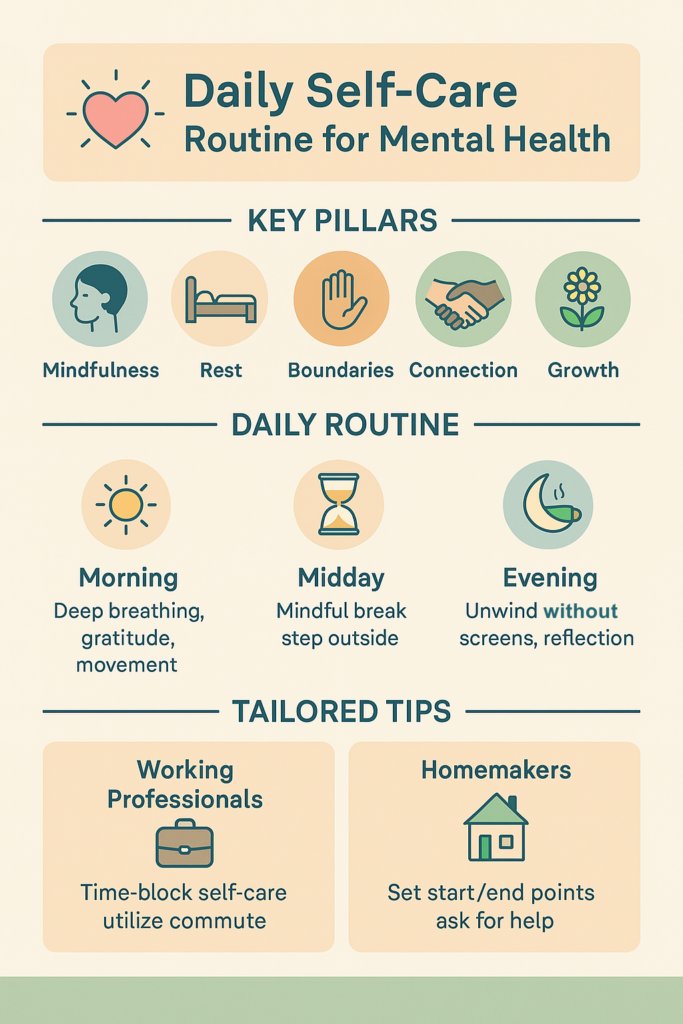Did you know that 80% of people experience burnout simply because they neglect self-care? In a world that constantly demands our attention, whether you’re a busy professional or a dedicated homemaker, it’s easy to forget about the most important person in your life: you. Prioritising your mental health daily is not just a choice; it’s an empowering act of self-love and well-being that can genuinely transform your life. It’s a gift you give yourself, regardless of your role or responsibilities.
Self-care isn’t selfish, It’s essential. When you carve out space for self-care, you’re not only showing up for yourself, but you’re also giving your mind the chance to reset and recharge. Whether it’s a brief moment of mindfulness before you jump into your day or taking time at night to unwind, each action contributes to your mental health in profound ways. With a focused self-care routine for mental health, you can feel more balanced, energised, and empowered every single day.
Let’s break down the self-care routine for mental health into three essential parts to make this achievable for anyone:
- Key Pillars of Self-Care routine for Mental Health
- A Simple & Achievable Daily Routine
- Tailored Tips for Working Professionals vs Homemakers

1. Key Pillars of a Focused Self-Care Routine for Mental Health
A well-rounded self-care routine should support your mental, emotional, and physical health. These are the foundational areas to focus on:
Mindfulness & Emotional Awareness:
Acknowledging your feelings without judgment means recognizing emotions without criticism. For young adults, mindfulness helps them stay present and avoid stress buildup. By simply accepting your emotions, you can process them more effectively, reduce overthinking, and respond thoughtfully, leading to healthier emotional well-being and better stress management.
Rest & Recovery:
Your mind and body need downtime to recharge. Prioritising rest helps reduce stress, improve focus, and boost emotional balance. Taking time to recover allows you to be more productive, clearer in your thinking, and better equipped to handle life’s challenges.
Healthy Boundaries:
Knowing when to say “no” and “yes” without guilt is essential for maintaining your well-being. Saying “no” when necessary allows you to prioritize what’s important while saying “yes” aligns with your values and needs. Boundaries are an essential tool in maintaining a balanced and healthy self-care routine for mental health.
Connection:
Humans thrive on social connections. Feeling emotionally supported by friends, family, or communities helps combat loneliness and isolation. Having people to talk to, share experiences with, and rely on provides comfort, boosts mental health, and strengthens resilience, making it easier to navigate life’s challenges together.
Growth & Joy:
Engaging in activities that excite you or contribute to personal growth nourishes your soul. Whether it’s pursuing hobbies, learning new skills, or exploring passions, these experiences bring joy, purpose, and fulfilment. They ignite your creativity, boost confidence, and help you grow into the best version of yourself.
Physical Activity:
Exercise triggers the release of endorphins, which improve mood, focus, and energy. Whether it’s a workout or a short daily walk, physical activity helps reduce stress, clear your mind, and keep your body energised. Even small bursts of movement can make a big difference in your overall well-being.
Nutrition & Hydration:
What you eat directly impacts your mental state. Nourishing your body with healthy foods and staying hydrated helps stabilize mood and energy levels. A balanced diet rich in nutrients supports brain function, improves focus, and reduces stress, leading to better emotional and mental well-being throughout the day.
2. Simple & Achievable Daily Self-Care Routine for Mental Health (30–45 mins total)
Here’s a quick routine that works whether you’re balancing work deadlines or managing a household. It’s flexible and can be done in bite-sized chunks throughout the day.
Morning (10–15 mins)
- 2 mins:
Start with deep breathing or grounding exercises before touching your phone. This will help centre your mind and set a positive tone for the day.
- 5 mins:
Write in a gratitude journal, list three things you’re thankful for. This simple practice shifts your focus from stress to appreciation.
- 5–10 mins:
Do some light stretching or movement, whether it’s yoga, a short walk, or dancing to your favourite tune. It gets your body energized and your mind focused.
Midday (5–10 mins)
- Mindful Break:
Pause for a mental check-in. Ask yourself, How do I feel at this moment? This helps you recalibrate and release any built-up tension.
- Optional:
Step outside, sip water or listen to calming music. A brief moment of fresh air or stillness can refresh your mind and improve your focus.
Evening (15–20 mins)
- Screen-Free Unwind Time:
Dedicate at least 10 minutes to unplug, whether it’s reading a book, painting, journaling, or simply sipping tea in silence.
- Daily Reflection:
Take a moment to reflect, What went well today? What do I need more of tomorrow? This helps you close the day on a positive note.
- 5 mins:
Finish with affirmations or breath work. Clear your mind and set intentions for a restful sleep.
Optional Add-ons (3x a week):
- Talk to a loved one or therapist to process emotions.
- Engage in a hobby like music, art, or writing to boost creativity.
- Digital detox: Disconnect from social media for 2–3 hours in the evening to recharge.
3. Key Points to Tailor This for Your Lifestyle
Whether you’re a professional hustling through meetings or a homemaker juggling a multitude of tasks, these tips can help you adopt a self-care routine that works for you.
For Working Professionals:
- Time-block self-care just like you would a meeting. Prioritise it and make it non-negotiable.
- Start the day with you, avoid checking emails or messages first. Use that time to ground yourself.
- Utilise your commute for mindfulness, listen to podcasts, practice breath work, or enjoy moments of silence.
- Make your lunch break a “no-screen” zone. Use this time to step away from work and reset.
- End your workday with a small ritual (like closing your laptop, lighting a candle, or taking a brief walk) to create a mental separation between work and home life.
For Homemakers or Remote Workers:
- Set clear start and end points for your day. This helps avoid burnout and keeps you in control of your time.
- Treat breaks as non-negotiable. Whether it’s a coffee break or a few minutes of fresh air, you deserve a breather.
- Don’t hesitate to ask for help, delegating tasks doesn’t make you any less capable. It allows you to conserve energy for your mental well-being.
- Connect with others, join online communities or local groups of like-minded people. Isolation can be a challenge, but you’re not alone.
- Engage in activities that offer growth or creativity, whether it’s a hobby, online course, or project that excites you.
Additional Self-Care Topics to Explore
The Power of Journaling for Mental Health:
Journaling is a powerful tool in daily mental health habits. Explore how writing can help manage stress, organise thoughts, and boost emotional well-being. Provide journal prompts and techniques.
Mindful Productivity: How to Balance Work and Self-Care:
Discuss how to work efficiently while maintaining a healthy mental state. Include tips for reducing burnout and avoiding overwhelm. A self-care routine for mental health helps you avoid overwhelm and be present in your work while preserving your well-being.
The Role of Sleep in Mental Health:
Highlight the importance of sleep for emotional and cognitive function, and offer tips for improving sleep hygiene. Improving sleep hygiene such as creating a consistent bedtime routine, reducing screen time before bed, and ensuring a comfortable sleep environment is an essential part of mindful self-care practices.
How to Build Emotional Resilience:
Strengthening this resilience can be part of your emotional well-being routine, including how to handle setbacks, develop coping mechanisms, and maintain a positive mindset. Resilient people are more adaptable and able to maintain a positive mindset in difficult times.
The Impact of Digital Detox on Mental Health:
Talk about how constant screen time affects mental health and how taking regular breaks from technology can improve well-being. Implementing a digital detox such as taking 2-3 hours a day away from screens or having a tech-free evening is a vital part of stress management.
The Importance of Social Support in Mental Health:
Discuss how friendships, relationships, and communities play a crucial role in boosting mental health and provide ways to strengthen social connections.
Self-Compassion: Being Kind to Yourself During Tough Times:
Explore how practising self-compassion can reduce stress and improve mental health, especially during periods of struggle.
The Connection Between Nature and Mental Health:
Examine how spending time outdoors can improve mood, reduce anxiety, and enhance cognitive function. Whether it’s a walk in the park, hiking, or simply sitting outside to enjoy fresh air, nature has a powerful impact on mental well-being.
Overcoming Perfectionism: Embracing Imperfection for Better Mental Health:
Discuss how perfectionism can contribute to stress and anxiety, and offer strategies for embracing imperfection.
The Role of Creativity in Mental Health:
Explore how creative outlets like art, music, writing, or cooking can serve as a form of self-care and a tool for emotional expression.
Final Thought:
Remember, there’s no “perfect” self-care routine for mental health. The most important part is finding what works best for you and sticking with it. Begin small, and focus on making it enjoyable rather than just another task on your to-do list. This is your time to recharge, reflect, and find balance.
Your well-being matters and you deserve to feel nourished, see and grounded each day. Let your daily stress management techniques be the empowerment tool that fuels you, giving you the energy and clarity to take on whatever comes your way.
You’ve got this!
FAQs for Daily Self-Care Routine for Mental Health
A daily self-care routine for mental health involves incorporating small practices and habits into your daily life that support emotional, mental, and physical well-being. These can include activities like mindfulness, exercise, journaling, connecting with loved ones, and ensuring adequate rest and relaxation.
Self-care is key to keeping your mind healthy. It helps reduce stress, manage anxiety, and build resilience to life’s challenges. A self-care routine for mental health can prevent burnout, improve emotional well-being, enhance focus, and help you stay present in everyday life.
Consistency can be challenging, but there are a few tips to stay on track:
Set small, achievable goals that you can commit to every day.
Create a routine and stick to it, even if it’s just for a few minutes each day.
Track your progress and celebrate small wins to stay motivated.
Find accountability by sharing your routine with a friend or family member.
The amount of time dedicated to daily mental health habits depends on your schedule, but it doesn’t need to be long. Even a 10-15 minute practice can be effective. A full routine might take 30–45 minutes, but you can break it up into smaller chunks throughout the day (morning, midday, and evening).
Absolutely! A self-care routine for mental health should be tailored to your specific needs, preferences, and lifestyle. Whether you are a busy professional, a homemaker, or a student, your routine can reflect what works best for you. Feel free to experiment with different activities, and adjust them as needed.
Reference:
https://www.apa.org/monitor/2012/07-08/ce-corner
https://www.nimh.nih.gov/health/topics/caring-for-your-mental-health
https://www.health.harvard.edu/mind-and-mood/how-exercise-can-boost-your-mood


